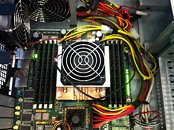Wednesday, October 31st 2012

Intel Envisions Do-it-all 48-Core Mobile Processors
Researchers at Intel have begun ground work on many-core processors that could drive ultra-mobile devices (such as tablets, smartphones, Ultrabooks, etc.,) in the near future. It design calls for no less than 48 processing cores on a piece of silicon, built on the "single-chip cloud computer" (SCC) design. The new technology could reach the markets anywhere between five to ten years from now, probably since current silicon fabrication technologies aren't advanced enough to put that much processing power into a chip that runs off a smartphone battery.
"If we're going to have this technology in five to 10 years, we could finally do things that take way too much processing power today," said Patrick Moorhead, an analyst with Moor Insights and Strategy. "This could really open up our concept of what is a computer... The phone would be smart enough to not just be a computer but it could be my computer." With devices like Microsoft Surface, which transform from a tablet to a fully-functional desktop with a dock, or a notebook with the flip of a smart cover, the definition of what constitutes a personal computer is changing. In a few years, your mobile could transform into a computing device of any shape and size for consumers.
Source:
Computer World
"If we're going to have this technology in five to 10 years, we could finally do things that take way too much processing power today," said Patrick Moorhead, an analyst with Moor Insights and Strategy. "This could really open up our concept of what is a computer... The phone would be smart enough to not just be a computer but it could be my computer." With devices like Microsoft Surface, which transform from a tablet to a fully-functional desktop with a dock, or a notebook with the flip of a smart cover, the definition of what constitutes a personal computer is changing. In a few years, your mobile could transform into a computing device of any shape and size for consumers.

23 Comments on Intel Envisions Do-it-all 48-Core Mobile Processors
Course on the plus side maybe we'll start seeing more multithreading emphasis in computing. But then that would mean, Intel is helping AMD by trying to turn the industry.
win8 will have support :)
On topic: Is this really practical for mobile processing?
Think of a GPU as a ton of floating point units that run the same instruction on all the FPUs at the same time. This is over-simplistic of what modern day video cards do, but I believe it is an accurate representation of what is happening internally. A multi-core CPU can be doing vastly different things all at once where a GPU has much more trouble doing this.
So all in all, I guess what I'm really trying to say is that CPU capabilities are very broad and can be applied to multiple purposes where a GPU is considerably more specialized in the kind of workloads it can handle.
GPUs are good at what they do because the hardware they use is specialized for the particular task they usually run: massively parallel rendering. If you make them better at "a variety of loads", then you have to introduce stuff like out of order execution, branch prediction, all of which take up space on the GPU die, and all of which makes each compute unit more complex.
MIPS is no where near as flexible as x86 but x86 takes a performance penalty for it. Which is faster depends on the workload.